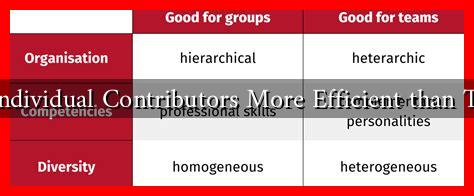-
Table of Contents
Are Individual Contributors More Efficient than Teams?
In the modern workplace, the debate over whether individual contributors are more efficient than teams is a topic of considerable interest. As organizations strive for productivity and innovation, understanding the dynamics of individual versus team performance becomes crucial. This article explores the efficiency of individual contributors compared to teams, examining various factors that influence productivity, collaboration, and overall success.
The Case for Individual Contributors
Individual contributors, often referred to as “ICs,” are professionals who work independently on specific tasks or projects. Their efficiency can be attributed to several factors:
- Autonomy: Individual contributors often have the freedom to make decisions and manage their time, leading to increased motivation and job satisfaction.
- Specialization: ICs typically possess specialized skills that allow them to excel in their areas of expertise, resulting in high-quality output.
- Reduced Coordination Costs: Working alone minimizes the need for meetings and communication, which can often slow down progress in team settings.
For instance, a software developer working independently on a coding project can focus solely on writing code without the interruptions that come from team discussions. According to a study by the Harvard Business Review, individual contributors can complete tasks up to 30% faster than teams when the work is highly specialized and requires deep focus.
The Strengths of Team Collaboration
While individual contributors have their advantages, teams also bring unique strengths that can enhance efficiency:
- Diverse Perspectives: Teams consist of individuals with varied backgrounds and skills, fostering creativity and innovative problem-solving.
- Shared Workload: Distributing tasks among team members can lead to faster completion of projects, especially when the workload is substantial.
- Accountability and Support: Team members can hold each other accountable, providing motivation and support that can drive performance.
A notable example is the success of the Apollo 11 mission, where a diverse team of engineers, scientists, and astronauts collaborated to achieve a monumental goal. Their combined expertise and teamwork were essential in landing humans on the moon, demonstrating that complex tasks often require collaborative efforts.
When Individual Contributors Outperform Teams
There are specific scenarios where individual contributors may outperform teams:
- Creative Tasks: In fields like writing, design, or programming, individual creativity can shine without the constraints of group consensus.
- Short-Term Projects: For projects with tight deadlines, individual contributors can often deliver results more quickly than teams that require coordination.
- High-Complexity Tasks: Tasks that require deep focus and expertise may benefit from the singular attention of an individual rather than the divided focus of a team.
Research from the University of California, Berkeley, indicates that individuals working on complex problems can achieve better outcomes when they are not distracted by team dynamics. This suggests that for certain types of work, individual contributors may indeed be more efficient.
When Teams Excel Over Individual Contributors
Conversely, there are situations where teams clearly outperform individual contributors:
- Complex Problem Solving: Teams can tackle multifaceted issues more effectively by pooling their knowledge and skills.
- Long-Term Projects: For projects requiring sustained effort over time, teams can maintain momentum and motivation through collaboration.
- Innovation and Brainstorming: Team environments often foster creativity through collaborative brainstorming sessions, leading to innovative solutions.
A study by Google on their Project Aristotle found that psychological safety and team dynamics significantly impacted team performance, highlighting the importance of collaboration in achieving high efficiency.
Conclusion
The question of whether individual contributors are more efficient than teams does not have a one-size-fits-all answer. Both approaches have their merits and can be more effective depending on the context, task complexity, and organizational goals. Individual contributors excel in specialized, creative, and short-term tasks, while teams shine in collaborative problem-solving and long-term projects.
Ultimately, organizations should strive to find a balance between leveraging the strengths of individual contributors and fostering effective teamwork. By understanding the unique advantages of each approach, businesses can optimize their workflows and enhance overall productivity. For further insights on team dynamics and productivity, consider exploring resources from the Harvard Business Review.


